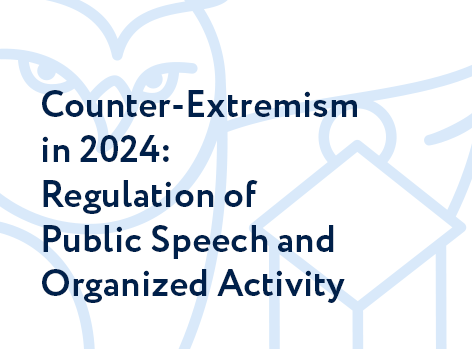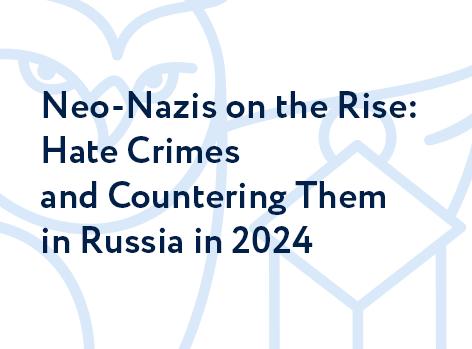On May 3, 2007, in Berlin, EU and Russia hold the fifth round of their Human Rights Consultations (see press-releases of Russian Ministry of Foreign Affairs and of the European Union).
The SOVA Center took part in the traditional preliminary meeting of the representatives of Russian and international NGOs and the European officials who participate in the consultations (Russian diplomats, unfortunately, decline participation in these meetings). The Russian part was represented by the Memorial, Moscow Helsinki Group, Center for the Development of Democracy and Human Rights, Demos, "Civic Assistance" Committee, Glasnost Defense Foundation and the SOVA Center. From the EU part there were officials of the EU institutions and of the Ministries of Foreign Affairs of Germany and Portugal (the actual and the following EU chairman countries), some of the European Ombudsmen. Russian NGO representatives reported on the problems which were chosen as priority for this round of the consultations and gave their view of the recent events in Tallinn.
The SOVA Center presented the following short report and recommendations to the authorities on the problem of misuse of the anti-extremism legislation, and also report and recommendations on hate crimes in Russia.
Recently, excessive references to the theme of "counteracting extremism" to justify unfounded restriction of civil and political rights have become an increasingly serious problem. This abusive practice can be observed at three levels: campaigning ("propaganda"), legislative amendments, and law enforcement practices.
Abusive campaigns emerged more than a year ago. Official and semi-official propaganda labels opposition members as "fascists" or "extremists" - even though they have nothing to do with nationalism or political violence.
The term "extremism" was introduced in the legal system at the time when the Federal Law on Counteracting Extremist Activity was adopted in July 2002 and then extended in July 2006. It defines extremism through a long list of acts. The definition (see it here) fails to establish shared characteristics of an extremist activity, so the list can be easily modified as needed - as we witnessed last July.
The single word "extremism" as defined by the law describes a mixture of very different actions, from very dangerous to almost not dangerous, enabling arbitrary and selective enforcement, and even making such enforcement inevitable. This excessively broad definition is combined with excessively tough sanctions against organizations, media outlets, and in some cases against individuals (see more detailed analysis).
The Federal Law on Counteracting Extremist Activity has been rarely applied in general; however, in the recent year, and particularly in the past six months, we have observed an increasing number of cases where this law and related rules have been abusively enforced to restrict citizens' rights and liberties (see main examples here). We will note here only those dangerous tendencies which have emerged in the enforcement practices over the past six months.
Firstly, the anti-extremist legislation is constructed in such a way that a single finding of an individual, group or text to be extremist entails more findings of this type through the mechanisms of "assistance" or "justification" or "excuse." It was demonstrated by courts in Moscow in late 2006, when they upheld a warning issued to the Memorial Human Rights Society for allegedly extremist activity. The incident involved Memorial's publishing of the opinion of Russian Mufti Nafigulla Ashirov, who denied any presence of incitement to violence or hatred in the four main brochures produced by the Hizb ut-Tahrir party, which is banned in Russia by the Supreme Court. Disagreement with a judgment (even if the person who disagrees is wrong) should not be considered illegal.
Secondly, the authorities increasingly pressure and even close newspapers just for reporting intolerant opinions or updates on activities of certain radical groups. In the most recent case of this type, judicial proceedings have been initiated in the Komi Republic against Zyryanskaya Zhizn paper, which now faces a ban. The main reason for proceedings has been a politically incorrect quote of the Komi Ombudsman.
Thirdly, courts give a broad interpretation of "incitement to hatred and animosity against a certain social group" - a clause included in art. 282 of the Criminal Code alongside other potential grounds for hatred; the problem is that the Criminal Code fails to define "a social group." This part of art. 282 has been used to punish people for their criticism of government, which appears to impose excessive restrictions on the freedom of expression. Over the past months, Russian courts have convicted people for incitement to hatred against "the Russian army" (the case of Boris Stomakhin) and against "the Government of the Republic" (the case of Vitali Tanakov in the Marii El Republic). A similar investigation is currently underway into critical remarks against police in the Komi Republic.
And fourthly, the application of anti-extremist legislation has increasingly shifted towards being used as an instrument against political opposition. The Moscow City Court judgment of 19 April banning the National Bolshevik Party (NBP) for extremism is difficult to assess from the point of view of its consistency with the law before we analyze the reasoning behind the judgment. It is obvious that the NBP members have committed many offenses and the ideology of this organization in the 90-ies could even be described as neo-fascist. But in recent years, NBP has undergone dramatic changes of ideology, while the offences committed by its members recently have not really posed any serious danger. It is unlikely that they justify a measure as tough as a ban.
Should the ban become effective, any pronouncement on behalf of NBP will potentially be regarded as an offense (art. 282-2 of the Criminal Code, which is now frequently enforced against actual or assumed members of Hizb ut-Tahrir; punishable by up to 2 or 3 years of prison), whereas any support or even defense of NBP members will be regarded as extremist activity. Even with selective application, it will dramatically broaden the unlawful enforcement of anti-extremist legislation and target in particular the democratic political opposition and human rights defenders.
RECOMMENDATIONS
There is a need to review the current legislation, in particular the Federal Law on Combating Extremist Activity, and define the forbidden activities in a more narrow and concrete manner. This improvement would ultimately make the law work and avoid its excessively broad and selective application.
The top officials in the Prosecutor General's office and in the Ministry of Culture and Mass Communications should study the anti-extremist enforcement practices and draft guidelines for their staff to suppress abuse of this legislation.
The drafting of such guidelines and amendment of the current legislation requires serious and open discussion involving, in addition to law enforcement authorities, NGOs concerned.
In the future, attempts should be made to avoid the use of such a "politically loaded" term as "extremism" and to encourage the use of the "hate crime" concept instead, which is more operational and less liable to abuse.




